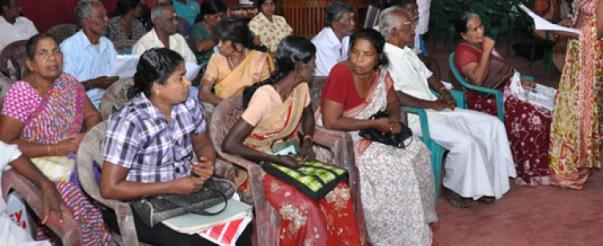( Public hearing by present missing persons commission in Jajfna )
Introduction
1. In September 2015, the Government stated that it will create “an Office on Missing Persons based on the principle of the families’ right to know, to be set up by Statute with expertise from the ICRC, and in line with internationally accepted standards.” Although the Consultation Task Force has initiated public consultations on the proposed transitional justice mechanisms, the Government appears to be running a parallel process shrouded in secrecy. It has been brought to our notice that the Government has shared draft documents relating to the Office of Missing Persons (“OMP”) with selected international agencies, such as the International Committee of the Red Cross (“ICRC”) and the Office of the High Commissioner for Human Rights (“OHCHR”). However, the Government has not disclosed any information relating to the key elements and ideas that are contained in these drafts to the public. To date, other than the title “Office of Missing Persons”, there is no publicly available information about the Government’s intended proposals for the OMP.
2. The Government has stated officially that the OMP will be a separate transitional justice mechanism. There are also indications that the OMP will be created prior to the other transitional justice mechanisms. In these circumstances, it is imperative to establish at the start of the process that the OMP does not operate in isolation from the other transitional justice mechanisms, in particular the special court, as well as the existing criminal justice system.
3. We, the signatories to this memorandum, take this opportunity to make submissions on issues we believe are of importance in relation to the OMP.
Current context
4. According to news reports, between 11 and 23 persons have been detained under the Prevention of Terrorism Act (“PTA”), from the North and East, during the period March to April 2016. We have verified and documented the case of at least one person, Jeyanthan, who was abducted in a white van from his home in Jaffna on 10 April 2016 and was subsequently found to be detained by the Terrorism Investigation Department (“TID”) under the PTA.
5. News reports and confidential interviews indicate that Tamils in the North, particularly former Liberation Tigers of Tamil Eelam (“LTTE”) cadres and detainees who underwent rehabilitation and were released, have been subjected to fresh investigations. It has also been reported that an unspecified number of rehabilitated and released former LTTE cadres have been summoned to Colombo on 30 April 2016, by the Ministry of Rehabilitation. On 27 April 2016, a journalist and youth political activist who had spoken out against the recent incidents of arrests and abductions was himself arrested and detained by the TID.
6. Three other persons who were reported as missing to the Paranagama Commission and who were subsequently found in a prison in The Maldives, were returned to Sri Lanka this month. The Sri Lankan authorities had not informed the detainees’ family members of their return. Having searched for them, the family members eventually found them to be detained at the Welikada Prison. However, more than two weeks following their return to Sri Lanka, their family members were not informed as to the reasons for their detention.
7. Based on our own interviews and news reports, April 2016 appears to have recorded the highest number of arrests and ‘abduction turned arrests’ under the PTA, in the North and East since March 2014. At the time of writing, new reports of arrests and ‘abductions turned arrests’ continue to emerge. The official state response on the arrests has been to justify them on the grounds that the security forces have the right to arrest anyone that they believe to be involved in criminal activity and that former LTTE cadres have been arrested in connection with a hidden cache of weapons.
8. The use of white van abductions and increased number of arrests under the PTA, and not the general Penal Code, which should apply to criminal acts, is a matter of grave concern. The PTA is a regressive piece of legislation which this Government has committed to amend and/or repeal and is currently under review. Particularly provisions of the PTA, including those enabling extended administrative detention, ousting judicial supervision over detention, and rendering admissible confessions obtained before a police officer, arguably do not conform to the requirements of ‘law’ or legality under international law.
9. The manner of arrest, in the case of persons who have been abducted and later found to be detained by the TID under the PTA, constitutes a clear violation of their fundamental rights to equality, freedom from arbitrary arrest and detention, and freedom from torture. As mentioned above, we have verified at least one instance of an ‘abduction turned arrest’ in the case of Jeyanathan on 10 April 2016.
10. The incidents above have caused a fear psychosis amongst Tamils in the North and East. Individuals who will be integral to the functioning of the OMP, including families of missing and disappeared persons, witnesses, and informants, will not feel free to engage with the process if this insecure environment prevails.
Read the full memorandum as a PDF Submission on OMP to Consultation Task Force-01May2016
